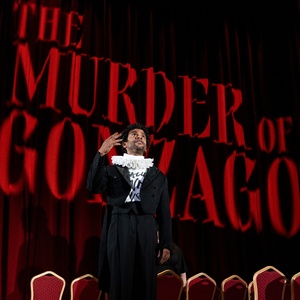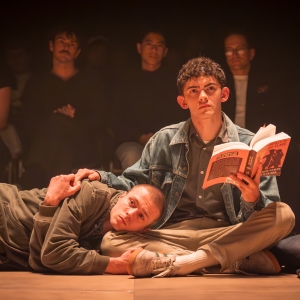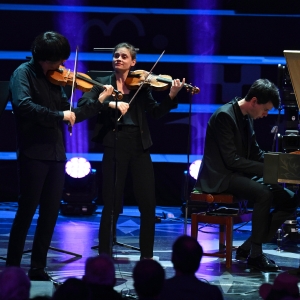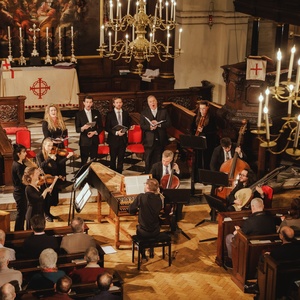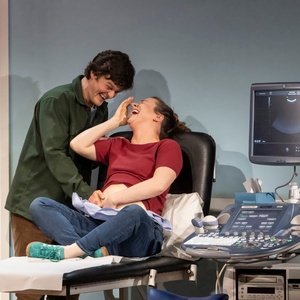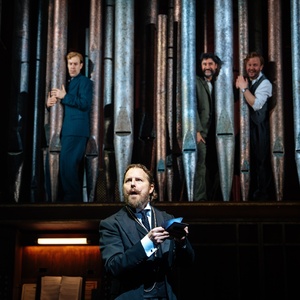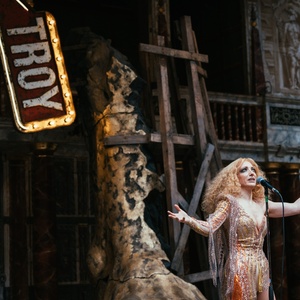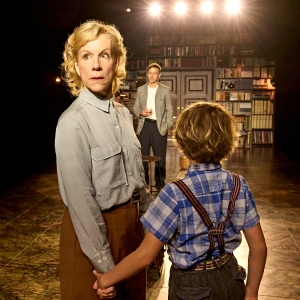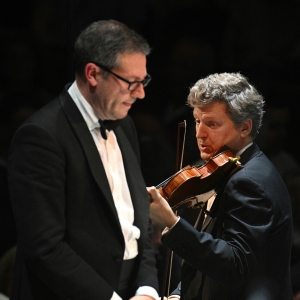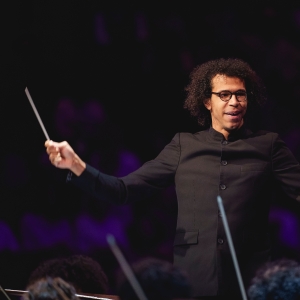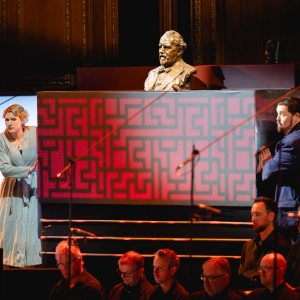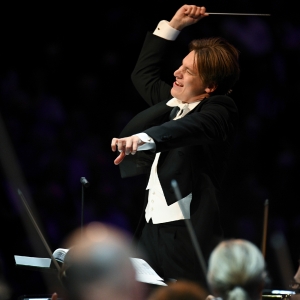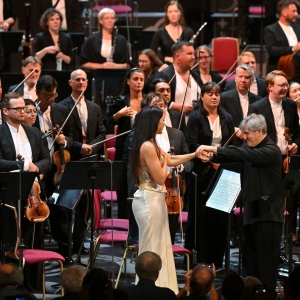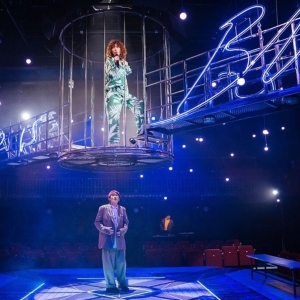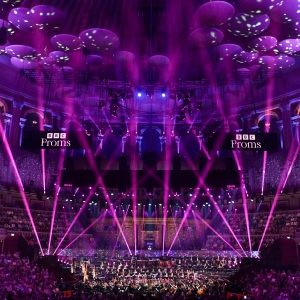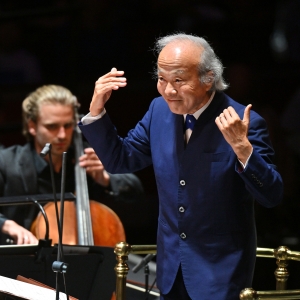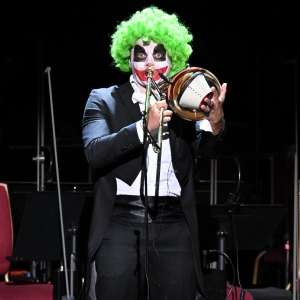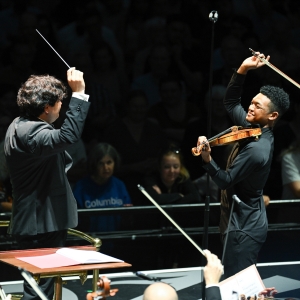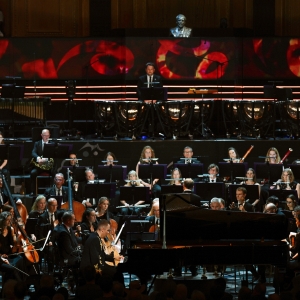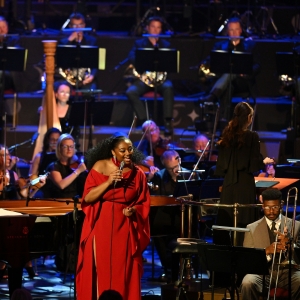Debbie Gilpin

MOST POPULAR ARTICLES
February 26, 2026
The 2026 edition of the London Handel Festival, which kicked off last week, is running under the theme of From Heavenly Harmony. The five-week event aims to “enrich lives through Handel’s music”, with concerts and recitals taking place in a variety of venues across London - last night saw The English Concert tackle five pieces from Handel and JS Bach, all in the realms of ‘splendour’ and ‘devotion’.
January 24, 2026
What would you do if the results of your 20-week pregnancy scan were not what you were expecting? Would you continue with the pregnancy and adapt to the serious additional needs your baby is likely to have, or could you take the decision to have a termination? That is the choice facing Rosie Sheehy and Robert Aramayo’s characters in Guess How Much I Love You?, the current production in the Jerwood Theatre Downstairs.
December 17, 2025
“And thus the whirligig of time brings in his revenges.” Following rave reviews, the RSC’s most recent production of Twelfth Night finally makes its way to London as part of the Barbican’s winter season. Directed by Prasanna Puwanarajah, it sees Samuel West, Freema Agyeman, Michael Grady-Hall and others reprise their roles for this limited run - but does this “midsummer madness” feel at home in the festive season?
October 4, 2025
One of the least performed plays in Shakespeare’s canon, and also one of the most aptly labelled as a ‘problem play’; Troilus and Cressida is ostensibly about the romance between these two Trojans, but in reality much of the play focuses on the backdrop to their love - the ongoing siege of Troy by the Greeks. This production in the open-air Globe Theatre is the final new show of the summer season.
October 3, 2025
“Suit the action to the word, the word to the action.” Given the National Theatre’s history with one of Shakespeare’s most famous plays, a new production of Hamlet is a natural fit in Indhu Rubasingham’s inaugural season as artistic director. Robert Hastie follows the likes of Laurence Olivier, Peter Hall, and Cicely Berry in setting down his own take on the play, helping to kick off Rubasingham’s tenure in a bold fashion.
September 25, 2025
First performed at Dallas Theater Center in 2015, Samuel D. Hunter’s three-hander play Clarkston makes its British première in a production at Trafalgar Theatre, which is directed by Jack Serio. Set in the Washington state town of Clarkston, the lives of Connecticut native Jake and nearby Lewistonian Chris are intertwined as they find themselves working the nightshift together at Costco; both have secrets that they are trying to hide from - but does the answer lie in stacking shelves?
September 19, 2025
'Was what I did 'wrong'?' In 1945 Germany, Ruth is part of a UN relief programme which is seeking to reunite displaced people with their families - she’s passionate about the work, and is certain that what she’s doing is for the best. But in London 45 years later, she’s not so sure.
September 13, 2025
“All you need is love”, said The Beatles - a mantra that John Wilson and the Sinfonia of London seemed to take when putting together the programme for the penultimate Prom of 2025. With the starting point of Daphnis and Chloe, they expanded to include Richard Strauss’ tone poem Don Juan and Leonard Bernstein’s Serenade; the three pieces are also linked by Bernstein, as he “wrote or conducted and lectured on all three of these masterpieces”, explained conductor John Wilson in his programme interview. A very neat way to find three interlocked compositions.
September 6, 2025
The commemoration of the 50th anniversary of Dmitry Shostakovich’s death continues at this year’s Proms, as Chineke! took on his epic Symphony No. 10 in E minor, headlining this concert with this composition brought to life in the wake of Stalinist oppression. Also on the programme were two premières: Valerie Coleman’s Fanfare for Uncommon Times and James Lee III’s Visions of Cahokia. As with their 2023 Proms appearance, Samuel Coleridge-Taylor rounded off the selection - this time with The Bamboula.
September 2, 2025
Written between 1930 and 1932, The Lady Macbeth of the Mtensk District was first performed in 1934 - and received a scathing write-up in the Pravda newspaper in 1936, due to its graphic sexual violence and murderous female lead. Whilst it alludes to Shakespeare’s infamous character, the opera is actually based on Nikolai Leskov’s novella of the same name; it also inspired William Oldroyd’s 2016 film starring Florence Pugh, whose screenplay was written by Alice Birch.
August 24, 2025
The natural big events of every Proms season are the First and Last Nights - but when a superstar conductor in the making is booked for two appearances, these concerts also become moments to which audiences will gravitate. Klaus Mäkelä has plenty of achievements under his belt already, making his concerts appointment viewing; it came as no surprise that the Prommers were queued around the block before the doors opened, each hoping to claim a good spot for the evening.
August 20, 2025
How better to welcome the London Symphony Orchestra’s Chief Conductor to this year’s Proms than with an opera-themed programme? Sir Antonio Pappano is a vibrant character in the world of classical music, and the Royal Albert Hall felt like a fitting venue for him to showcase his continued passion for the artform; two powerful 20th century operas were the order of the day, performed to a packed out auditorium.
August 13, 2025
Joanna Bowman brings Shakespearean Italy to The Other Place at the RSC with her new production of his first play, The Two Gentlemen of Verona. At a pacy 90 minutes (without an interval) and set in the round, the play is reimagined for the present day with a talented cast of actor-musicians - an ideal way to introduce old and new alike to this piece of work.
August 10, 2025
“Do, or do not. There is no try.” On this occasion, the National Youth Orchestra chose to ‘do’, as they took on some of the most iconic orchestral music of the 20th century. The teenage ensemble were very keen to perform Gustav Holst’s Planets, and so it was quite natural that a suite of music from the Star Wars films should follow; the first performance at the Proms of Caroline Shaw’s The Observatory was chosen as a natural bridge between the two. This was kimono-clad conductor Dalia Stasevska’s first time working with the National Youth Orchestra - her natural enthusiasm proved a great match for their youthful exuberance.
July 31, 2025
It was a night of concerti for this Prom, with Polish composers Grażyna Bacewicz and Witold Lutosławski on the programme alongside Sergei Rachmaninov; three 20th century classics to be performed, in the form of Concerto for String Orchestra, Concerto for Orchestra, and the already alluded to Piano Concerto No. 2 in C minor. On this occasion, the BBC National Orchestra of Wales was led by Igor Yuzefovich, on loan from the BBC Symphony Orchestra.
July 24, 2025
Pierre Boulez and Luciano Berio were both born one hundred years ago in Montbrison and Oneglia, respectively. During the course of their lengthy careers, they worked separately and together, innovating in their own ways as the 20th century brought new technology to music. For this Late Night Prom, Ensemble intercontemporain (under conductor Pierre Bleuse) brought together three pieces to engage the two composers in posthumous conversation in the lofty surroundings of the Royal Albert Hall.
July 24, 2025
How better to celebrate a selection of Gallic compositions than with Cristian Măcelaru conducting the Orchestre Nationale de France? The programme for the evening was bookended by a pair of pieces by Ravel, with works by Joseph Bologne (better known as the Chevalier de Saint-Georges), Charlotte Sohy and Ernest Chausson - with young American violinist Randall Goosby making his first appearance at the Proms as the night’s featured soloist.
July 21, 2025
A slightly curious evening lay in wait with this Prom, performed by Bournemouth Symphony Orchestra under the guiding baton of Chief Conductor Mark Wigglesworth. Shostakovich, Ravel and Walton are all familiar names to the classical music enthusiast, but the pieces themselves don’t appear to have anything to link them; that it’s the 50th anniversary of Shostakovich’s death and the 150 years since Ravel’s birth is possibly as close as we’re going to get.
July 21, 2025
Once Proms season comes around, there aren’t many better places to be on a Sunday morning than at the Royal Albert Hall. It was a return to more traditional Proms fare this time, with a trip to the 17th and 18th centuries for a selection of mostly Vivaldi and Bach pieces - although the programme also featured work from some of their contemporaries, such as Giovanni Legrenzi and Nicola Matteis Jr.
July 21, 2025
The scheduling of certain Proms seems to be a controversial topic in some quarters, with certain factions expressing a desire for the first week of the season to be entirely classical - and then start dipping into different genres once the dust has settled. That’s not the way things are being done this year, however, with jazz newcomer Samara Joy making her Proms debut in the second concert of the season, and hot on the heels of back-to-back Grammys success.
Videos


